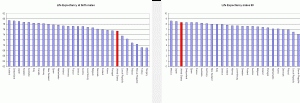Anti-Aging Medicine — the Promise of a better tomorrow
Anti-Aging Age Management Medicine
the Future of Health and Wellness

Anti-Aging Medicine / Age Management Medicine. What is it? Is it real? Are there real controversies here? In a word, yes. Can it be fulfilled in today’s guideline, task force, economic environment?
We are poised at a very important juncture. Anti-aging medicine offers promise of a goal oriented path to optimal health and well being. Or we can pursue restrictive policy driven, algorithms of cookbook medicine.
What needs to change? What gives it the stamp of approval? Is it science or politics? As the great philosopher Schopenhauer said:
“All truth passes through three stages. First it is ridiculed. Second, it is violently opposed. Third, it is accepted as being self-evident.”
There is a plethora of terms that have been spun off to better describe this new field. Longevity Medicine, Age Management Medicine, functional medicine, integrative medicine. These are all descriptions in pursuit of a new paradigm.
All medicine has from the beginning, most notably Hippocrates, been an effort to mitigate illness and suffering with the implicit goal of increasing life span. One yardstick could simply be life span or longevity. But we are more interested in quality of life. And here is the key. Increasing HealthSpan. It is about “squaring the curve” — living longer in a healthy, vibrant, vigorous, independent, and happy state of health and well being.
The paradigm shift is tectonic. We don’t have a health care system. We have a disease management system. All ICD-9 (now ICD-10) codes are a codification of disease. If you feel weak, fatigued or just “not right” you may not be suffering from a disease. You can have a battery of tests and nothing will “show positive” for a disease. You have a dysfunction. Pre-menopause is not really a disease. Yet it lasts for upwards of 4-5 years and can be seriously disabling. A dysfunction. Andropause is not even widely recognized as such. It is also a dysfunction that men suffer later than menopause. There is no formal ICD-10 code for andropause — just hypogonadism.
The wonderful medicine of the last 50 years has been disease-based , pathology-oriented with the goal of finding the right drug to cure or mitigate your disease. But there is a rapidly growing residua of conditions and patients who are not right, dysfunctional, that do not respond to the conventional or traditional approach. …
